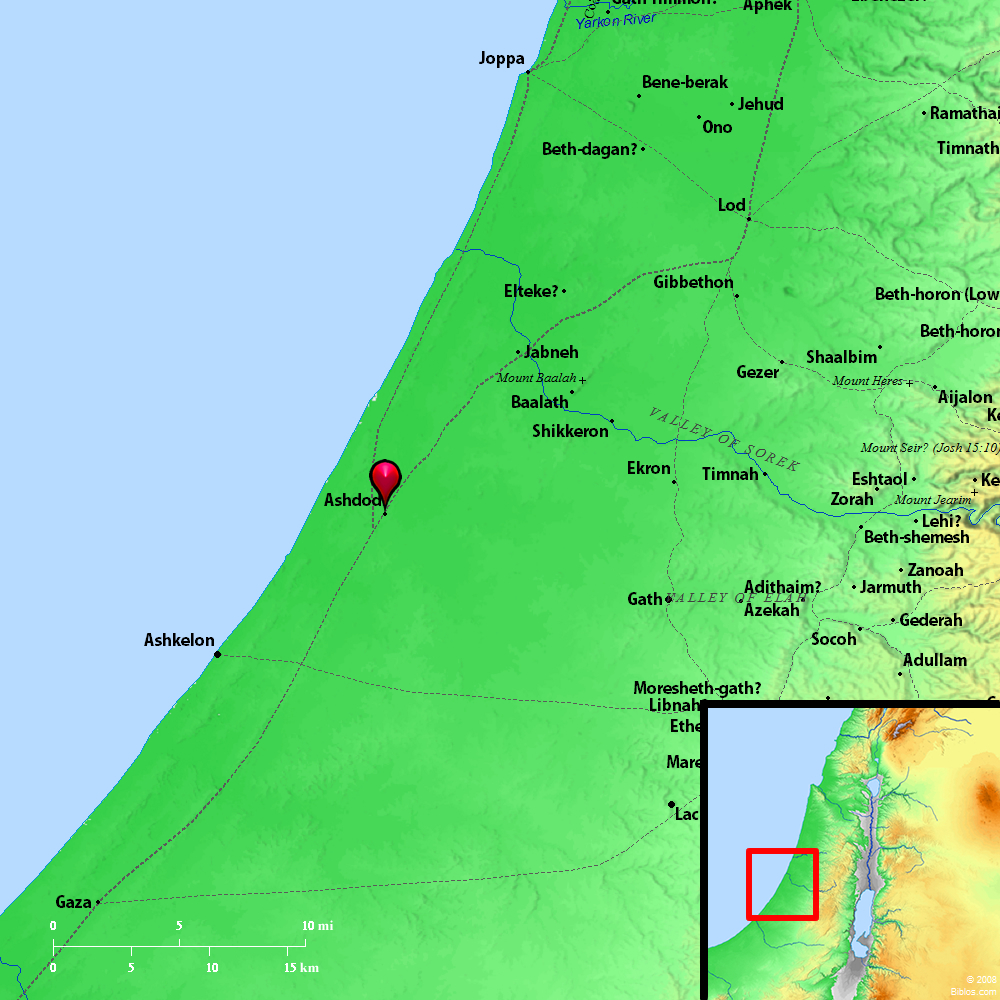Atlas  Ashdod and surrounding region Maps Created using Biblemapper 3.0 Additional data from OpenBible.info You are free to use up to 50 Biblos coprighted maps (small or large) for your website or presentation. Please credit Biblos.com. Occurrences Joshua 11:22 There were none of the Anakim left in the land of the children of Israel. Only in Gaza, in Gath, and in Ashdod, did some remain.Joshua 13:3 from the Shihor, which is before Egypt, even to the border of Ekron northward, which is counted as Canaanite; the five lords of the Philistines; the Gazites, and the Ashdodites, the Ashkelonites, the Gittites, and the Ekronites; also the Avvim, Joshua 15:46 from Ekron even to the sea, all that were by the side of Ashdod, with their villages. Joshua 15:47 Ashdod, its towns and its villages; Gaza, its towns and its villages; to the brook of Egypt, and the great sea with its coastline. 1 Samuel 5:1 Now the Philistines had taken the ark of God, and they brought it from Ebenezer to Ashdod. 1 Samuel 5:3 When they of Ashdod arose early on the next day, behold, Dagon was fallen on his face to the ground before the ark of Yahweh. They took Dagon, and set him in his place again. 1 Samuel 5:5 Therefore neither the priests of Dagon, nor any who come into Dagon's house, tread on the threshold of Dagon in Ashdod, to this day. 1 Samuel 5:6 But the hand of Yahweh was heavy on them of Ashdod, and he destroyed them, and struck them with tumors, even Ashdod and its borders. 1 Samuel 5:7 When the men of Ashdod saw that it was so, they said, "The ark of the God of Israel shall not abide with us; for his hand is severe on us, and on Dagon our god." 1 Samuel 6:17 These are the golden tumors which the Philistines returned for a trespass offering to Yahweh: for Ashdod one, for Gaza one, for Ashkelon one, for Gath one, for Ekron one; 2 Chronicles 26:6 He went forth and warred against the Philistines, and broke down the wall of Gath, and the wall of Jabneh, and the wall of Ashdod; and he built cities in the country of Ashdod, and among the Philistines. Nehemiah 13:23 In those days also saw I the Jews who had married women of Ashdod, of Ammon, and of Moab: Nehemiah 13:24 and their children spoke half in the speech of Ashdod, and could not speak in the Jews' language, but according to the language of each people. Isaiah 20:1 In the year that Tartan came to Ashdod, when Sargon the king of Assyria sent him, and he fought against Ashdod and took it; Jeremiah 25:20 and all the mixed people, and all the kings of the land of the Uz, and all the kings of the Philistines, and Ashkelon, and Gaza, and Ekron, and the remnant of Ashdod; Amos 1:8 I will cut off the inhabitant from Ashdod, and him who holds the scepter from Ashkelon; and I will turn my hand against Ekron; and the remnant of the Philistines will perish," says the Lord Yahweh. Amos 3:9 Proclaim in the palaces at Ashdod, and in the palaces in the land of Egypt, and say, "Assemble yourselves on the mountains of Samaria, and see what unrest is in her, and what oppression is among them." Zephaniah 2:4 For Gaza will be forsaken, and Ashkelon a desolation. They will drive out Ashdod at noonday, and Ekron will be rooted up. Zechariah 9:6 Foreigners will dwell in Ashdod, and I will cut off the pride of the Philistines. Encyclopedia ASHDODash'-dod ('ashdodh; Azotos; modern Esdud): One of the five chief cities of the Philistines. The name means stronghold or fortress, and its strength may be inferred by the fact that Psammetik I, of Egypt, besieged it for many years (Herodotus says 29). Some of the Anakim were found there in the days of Joshua (Joshua 11:22), and the inhabitants were too strong for the Israelites at that time. It was among the towns assigned to Judah, but was not occupied by her (Joshua 13:3; Joshua 15:46, 47). It was still independent in the days of Samuel, when, after the defeat of the Israelites, the ark was taken to the house of Dagon in Ashdod (1 Samuel 5:1, 2). We have no account of its being occupied even by David, although he defeated the Philistines many times, and we have no definite knowledge of its coming into the hands of Judah until the time of Uzziah (2 Chronicles 26:6). ASH'DOD, is in the N.T. called Azotus, Acts 8:40. Now called Esdud, it is 3 ms. from the Mediterranean and just half way from Joppa to Gaza, or 21 ms.., and 140 ft. above the sea. It has extensive ruins. Its history is found in Josh. 15:46, 47; 1 Sam. 5 and it is referred to 22 times. Strong's Hebrew H795: Ashdoda city of the Philistines |



